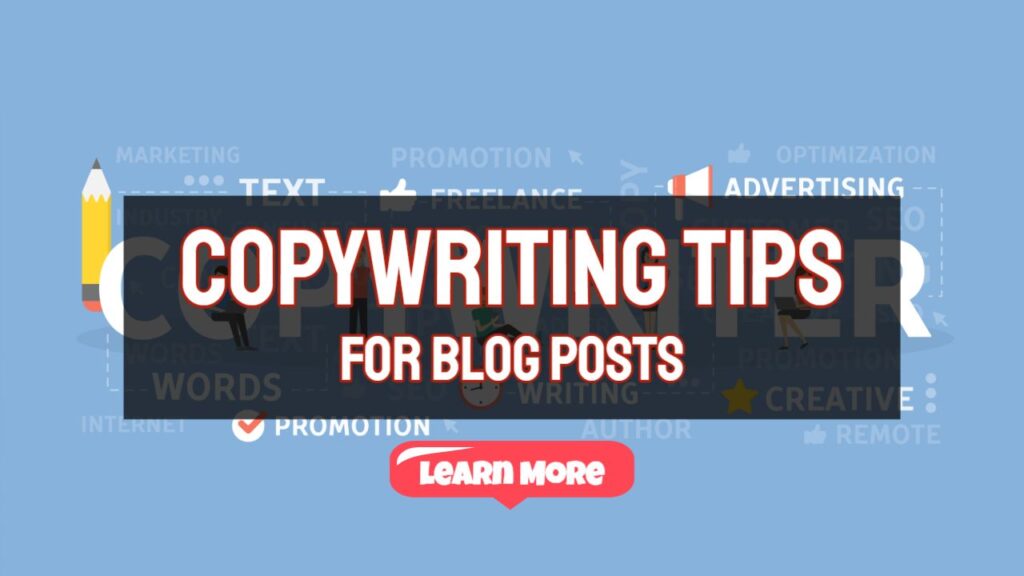Copywriting Tips for Blog Posts
Copywriting Tips for Blog Posts: Do you wish to create blog posts with a high conversion rate?
Aside from educating and informing your readers, the goal of your blog posts is to lure readers and generate leads and income for your products and services.
The goal of blog article copywriting is to promote reader engagement with your content, company, and products.
Optimizing your conversions when writing blog posts is crucial to assuring the profitability of your blogging.
How can you use your copywriting skills to create blog posts that are convincing, interesting, and relevant to your target audience?
This article looks at several copywriting ideas that might help you create blog posts that convert.
Catchy Headlines
Headlines are an excellent method for capturing people's attention and pique their interest. They are intended to divert the reader's attention away from other activities that may be competing for it.
Even if you have a well-written blog piece, if your title is not geared to capture your audience's interest, you will not earn any hits.
According to Copyblogger, whereas 8 out of 10 people interact with headlines, just 2 read an article after seeing its title.
Making an effort to write captivating headlines will help you get more click-throughs on your blog posts. High click-through rates will eventually increase conversion rates on your website.
Most copywriters adhere to a formula when it comes to creating attention-grabbing headlines. Buzzfeed, for example, generates its headlines using an algorithm. Here are some examples of headline formulas:
- Numbers (7 Steps to…, 20% of Readers…),
- Positive and emotional phrases (such as Stunning, Great, etc.),
- They occasionally incorporate derogatory phrases (such as Insane, Fear, Unbelievable, etc.).
- A question can also be used as a headline.
When generating headlines, use precise headers that accurately depict the true content of your blog piece.
Your First Paragraph is Important
Your first paragraph is your only opportunity to create an impact on the reader. Make ensure you do everything correctly.
Your introductory paragraph, as indicated in the title, should be followed by crucial information that your reader is eager to discover.
Your introductory paragraph gives you the opportunity to influence what your reader thinks about your blog material.
Your beginning paragraph should catch the reader's attention enough for them to want to keep reading, in addition to providing value to the reader.
Format Your Blog Post Appropriately To Increase Retention
It is crucial to organize your blog content into manageable categories. It holds your readers' interest throughout the essay.
Formatting your blog postings enhances the user experience of your viewers. It helps with understanding, which leads to improved conversion rates.
Subheadings can be used to organize subtopics inside a blog post. Your subheadings should speak directly to the reader and act as a guide to discovering information.
Using underlines, boldface, italics, and lists to design your blog posts might help you direct your readers' attention to the things you want to emphasize in your blog post. The style enhances the intelligibility of your blog material and is great for users looking for simple information.
Use Data to State Facts and Support Your Thoughts and Opinions
Copywriting relies on research and data to back up the benefits that product features provide.
Data may aid in the improvement and validation of your blog content. Including a scientific grounding in your content will increase the persuasiveness of your blog posts.
References boost your authority since they give people evidence to back up your claims.
Have an Elaborate call to action
A clear call to action is a crucial component of copywriting. Visitors to your website will take action, whether you want them to subscribe to your newsletter, donate, or purchase a product or service.
If your blog post sparked their interest, the next step would be to encourage them to take action.
So, how can you improve the effectiveness of your calls to action? Begin by making your call to action clear, precise, and succinct. Your guest should understand what you expect of them.
Make your call to action stand out and stand out from the rest of your website. For this purpose, brightly colored buttons are usually employed.
Include a sense of urgency [1] in your call to action to force your visitors to take action. Use forceful verbs and positive phrases in your content.
Giving your CTA visitors an option may also help them make a decision. Reverse psychology may be used to persuade your visitors to act. You can complete the task with a simple yes or no question.
Write Clear And Concise Messages
F
To convert blog posts or articles, a clear and straightforward message is necessary. Make sure your content is clear and concise to boost the number of conversions on your website.
Your objective is to establish a rapport with your audience. Remove the fluff and attempt to make an easy-to-understand blog piece. Unnecessary text dilutes the importance of your message, which is ironic.
A previous study on online content readability [2] indicates that the majority of people prefer reading language that is intelligible to 11-13 year-olds. Your information will have a bigger impact if you utilize simple language to break down tough themes.
For readability, short and straightforward phrases of 14-17 words are preferred. Your paragraphs should be two to three sentences long. Large blocks of text, especially on mobile devices, are difficult to read.
Bullet points can also help you draw your audience's attention to the main points of your work. They also give visual variety to your content.
Optimize For Mobile
Smartphones have changed the way people across the world absorb information. You don't have to be stuck at your desk to be aware of what's going on around you.
Optimizing your blog posts for mobile is just as important as doing the other measures necessary to boost your website conversion rates.
Mobile optimization, according to Google research [3,] requires understanding where mobile users' attention is focused—the middle of the screen. Make sure your copy is in the center of your mobile screen.
Utilize mobile-friendly website designs. The above-the-fold design is critical since it helps you to instantly attract the attention of your visitor.
Your text arrangement should be mobile-friendly as well. Check that your text is properly formatted and readable. Use white space between paragraphs to improve the reading experience even further.
Finally, make sure your copy can be scanned on a mobile device. Make certain that your core point is clear and that the benefits of your writing stand out.
Conclusion
Copywriting offers a plethora of knowledge on how to write blog articles that convert. You may use your copywriting skills as a yardstick to tweak your blog posts in order to attract, engage, retain, and convert readers.
Brought To You By: Google Ranking Monster
[1] https://www.searchenginejournal.com/create-urgency-conversions-sales/249643/
[2] https://vwo.com/blog/website-copy-readability/
[3] http://static.googleusercontent.com/media/research.google.com/en/us/pubs/archive/43224.pdf
The Article Copywriting Tips for Blog Posts – First Use Catchy Headlines was found on https://limitsofstrategy.com
The post Copywriting Tips for Blog Posts – First Use Catchy Headlines appeared first on https://gqcentral.co.uk






Recent Comments